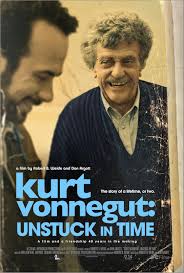
KURT VONNEGUT: UNSTUCK IN TIME
US, 2021, 127 minutes, Colour.
Directed by Robert B.Wiede, Don Argott.
And so it goes...
In his heyday, Kurt Vonnegut was considered one of the most influential writers in the United States. In succeeding decades, he was less popular but, eventually, made a comeback at the end of the 1990s. He was born in 1922. He died in 2007.
Writer-director Robert B.Wiede, made contact with Vopnnegut in the 1980. Contact and friendship continued over the succeeding decades, enabling Wiede to film Vonnegut in a great number of interviews, during travels, giving speeches… As well as Vonnegut ifilming in his private life. With such an amount of material available, as well as footage from television, this film is able to offer a portrait of Vonnegut in his own words.
While the film does trace the chronology of Vonnegut’s life and career, it does not do so in linear fashion, rather introducing Vonnegut, highlighting aspects of his personality and talent and inserting the chronology of his life and writing. Fortunately, a great deal of home movie footage was found, the family, with Vonnegut as a child, growing up, the depression, loss of their house, renting, the sadness of his mother’s death by overdose, the decline of his father. There is a focus on his brother Bernard, an expert in physics, and the sadness of the death of his sister.
In the interviews, often quite frank, with his daughters and his son as well as his adopted sons after the death of their mother, his sister. Initially, this led to a big happy family, but his marriage with his very supportive and encouraging wife, broke down. He left, married his second wife, achieved a great deal of fame, a public American celebrity…
The film also incorporates many interviews with literary experts, including novelist John Irving who was a student of his in Iowa, to get background to appreciate Vonnegut’s writing and its reception. A great deal of attention, as expected, is given to Slaughterhouse 5, the many drafts, corrections, changes of inspiration, and the drawing on, get his memories of World War II, taken as a prisoner of war, the bombing of Dresden and its consequences. When he was not writing, Von negut also sketched, many of his paintings and drawings, reminders of the style of Picasso. Attention is also given to his Breakfast of Champions and, in his later years, his writing of essays for various magazines, and his social and political Man Without a Country (2005).
The film is very personal documentary for Robert B.Wiede, in process for several decades, taken up, let go, an archive of material, and Vonnegut himself sending tapes of speeches and of material. In the meantime, Wiede was successful in screenwriting and documentaries, especially, winning awards for his work with Larry David in Curb Your Enthusiasm.
With Wiede on screen so often, this makes the documentary very personal. Many have responded well to his presence. Others have criticised it, noting that he appears, in their opinion, far too often, diverting attention to himself and his own life and career. And this seems particular case in his insertion of his wife’s illness in the 2010s.
Irrespective, say, of the Wiede personal material, this is a very good introduction to the life and work of Kurt Vonnegut, as shown by the author himself.